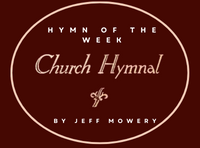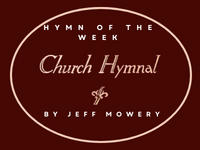I Will Sing of My Redeemer
I will sing of my Redeemer,
And His wondrous love to me;
On the cruel cross He suffered,
From the curse to set me free.
Chorus:
Sing, oh sing, of my Redeemer,
With His blood, He purchased me.
On the cross, He sealed my pardon,
Paid the debt, and made me free.
I will tell the wondrous story,
How my lost estate to save,
In His boundless love and mercy,
He the ransom freely gave.
I will praise my dear Redeemer,
His triumphant power I’ll tell,
How the victory He giveth
Over sin, and death, and hell.
I will sing of my Redeemer,
And His heav’nly love to me;
He from death to life hath brought me,
Son of God with Him to be.
Written by one of my favorite hymn writers, Phillip Bliss, this particular hymn is believed to be the last song he ever pinned. The song, however, came to us by tragic circumstances. In 1876, Mr. Bliss and his wife were invited to go to Chicago over the Christmas holidays to sing at the Moody Tabernacle. On December 29, they boarded a train and left for Chicago leaving their two children with Mr. Bliss’ mother. While crossing a bridge in Ohio, the bridge collapsed and the train went down the ravine. Mr. Bliss survived the initial crash, but while trying to save his wife from the fire that had broken out, Mr. Bliss and his wife both perished. When his trunk that he had packed for the trip later arrived in Chicago, the words of this song “I will sing of my Redeemer” were discovered.
Mr. Bliss and his wife died tragically at the age of 38. From one perspective, the world lost a great writer and musician, and two children lost their mother and father. But from another perspective, I am reminded by this story that the world is in desperate need of a Redeemer. I am reminded that I was in desperate need of a Redeemer. There is coming a fiery judgment one day. No one will be able to escape it on their own. But the good news is that there is a Redeemer. One who has paid the price for the punishment of sin. One who stands with His arms opened wide ready to save and show compassion to a lost and dying world. One who stands ready to rescue us from this disaster. He has already paid the price for our sins. Hallelujah!
Couple of comments on the lyrics:
- “My lost estate to save” – Typically, when I think about the word “estate,” I think of a huge tract of land with a beautiful home on it that has been in a family for several generations, or a large amount of wealth left in a bank or investment account. I don’t think of my own “lostness” as an estate. However, when I think about how large my sin was. When I think about how the sins of one generation can be passed on or inherited by future generations, this phrase really contains some truth. The estate of sin that I owned was vast. This sin had been passed on from Adam and Eve throughout the generations to billions of people including me. I am grateful today though that He came to redeem me. To pay the price for my sins and to set me free. To ransom me from my sin estate, and to provide for me a mansion in glory. What a great inheritance!!
- “Over sin, and death, and hell” – It would be a great thing to be redeemed from sin, but how tragic it would be if we still died and there was nothing after this life. Paul said in I Corinthians 15:19 “If in this life only we have hope in Christ, we are of all men most miserable.” But Jesus not only paid the price for the punishment of sin, He won the victory over sin, and death and hell. Isaiah 25:8 reminds us “He will swallow up death in victory; and the Lord GOD will wipe away tears from off all faces;” Paul asks a rhetorical question in I Cor. 15:55 when he says “O death, where is thy sting? O grave, where is thy victory?” It doesn’t exist. Because of Christ’s complete work on the Cross, sin, death, and hell are powerless to them that believe.
When I sing this song and read it’s words, a couple of things stand out to me. One is the strength of author’s commitment to sing of His Redeemer. In each of the four verses the author says “I will” do something. I will sing, tell, praise and sing again. He appears to have a “made-up mind.” But the chorus, however, there is an encouragement and an admonition to “sing.” I wondered if the author was encouraging fellow believers to sing of their Redeemer, or maybe, if the author was doing what you often times see in the Psalms. For example, in Psalm 104:1, the psalmist opens the psalm by saying “Bless the Lord, O my soul.” The psalmist is encouraging himself to do what he knows he should do – to praise the Lord. Later in that psalm in verse 33, the psalmist says “I will sing unto the LORD as long as I live: I will sing praise to my God while I have my being.”
Maybe Mr. Bliss was like the psalmist. He knew what he should do. He purposed in his heart that he was going to do those things (sing, praise, and tell), but he also knew that he needed to be encouraged and admonished sometimes to do the things that he knew to do. Do you ever find yourself in that place? A place where you need to remind yourself to do the things you know in your heart you need to do. Maybe in times of sorrow, we have to remind ourselves to praise Him because He promised to make us glad. Maybe in times of loneliness, we remind ourselves that Jesus promised “Lo, I am with you always” and we praise Him for that. Maybe in times where we stumble and sin, we remind ourselves that “The LORD is gracious, and full of compassion; slow to anger, and of great mercy” and we praise Him for being so kind and forgiving to us.
I hope as we approach the Easter season that we will remind ourselves to sing of our Redeemer. To sing and “survey the Wondrous Cross.” To sing of His “Amazing Grace.” To sing and cherish the “Old Rugged Cross.” Yes, and to “Sing, O Sing, of our Redeemer and His wondrous love.”

